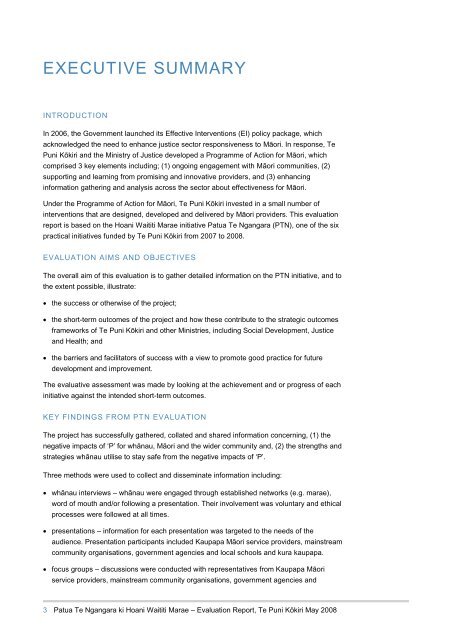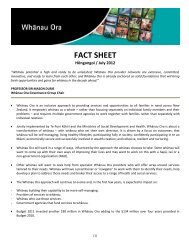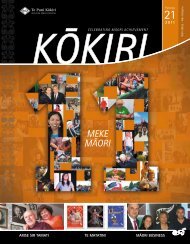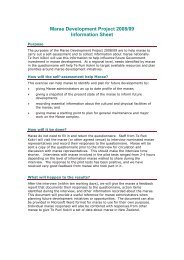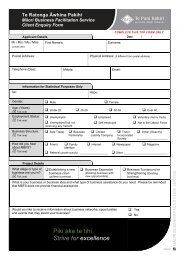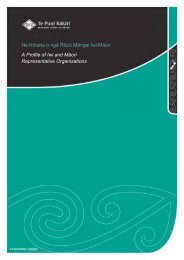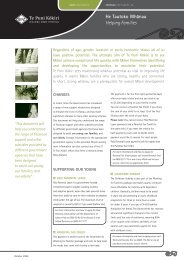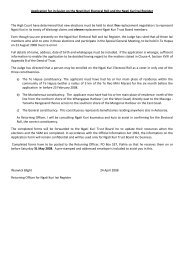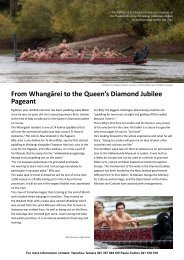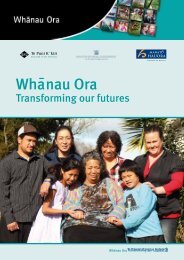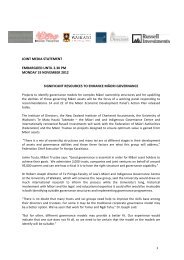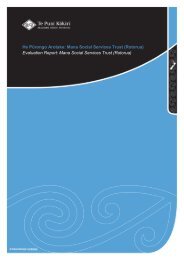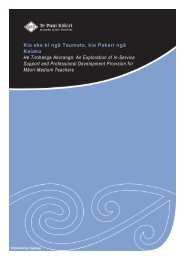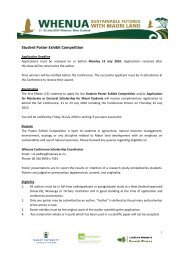Evaluation Report: Hoani Waititi Marae: PDF 1.4MB - Te Puni Kokiri
Evaluation Report: Hoani Waititi Marae: PDF 1.4MB - Te Puni Kokiri
Evaluation Report: Hoani Waititi Marae: PDF 1.4MB - Te Puni Kokiri
You also want an ePaper? Increase the reach of your titles
YUMPU automatically turns print PDFs into web optimized ePapers that Google loves.
EXECUTIVE SUMMARY<br />
INTRODUCTION<br />
In 2006, the Government launched its Effective Interventions (EI) policy package, which<br />
acknowledged the need to enhance justice sector responsiveness to Māori. In response, <strong>Te</strong><br />
<strong>Puni</strong> Kōkiri and the Ministry of Justice developed a Programme of Action for Māori, which<br />
comprised 3 key elements including; (1) ongoing engagement with Māori communities, (2)<br />
supporting and learning from promising and innovative providers, and (3) enhancing<br />
information gathering and analysis across the sector about effectiveness for Māori.<br />
Under the Programme of Action for Māori, <strong>Te</strong> <strong>Puni</strong> Kōkiri invested in a small number of<br />
interventions that are designed, developed and delivered by Māori providers. This evaluation<br />
report is based on the <strong>Hoani</strong> <strong>Waititi</strong> <strong>Marae</strong> initiative Patua <strong>Te</strong> Ngangara (PTN), one of the six<br />
practical initiatives funded by <strong>Te</strong> <strong>Puni</strong> Kōkiri from 2007 to 2008.<br />
EVALUATION AIMS AND OBJECTIVES<br />
The overall aim of this evaluation is to gather detailed information on the PTN initiative, and to<br />
the extent possible, illustrate:<br />
the success or otherwise of the project;<br />
the short-term outcomes of the project and how these contribute to the strategic outcomes<br />
frameworks of <strong>Te</strong> <strong>Puni</strong> Kōkiri and other Ministries, including Social Development, Justice<br />
and Health; and<br />
the barriers and facilitators of success with a view to promote good practice for future<br />
development and improvement.<br />
The evaluative assessment was made by looking at the achievement and or progress of each<br />
initiative against the intended short-term outcomes.<br />
KEY FINDINGS FROM PTN EVALUATION<br />
The project has successfully gathered, collated and shared information concerning, (1) the<br />
negative impacts of „P‟ for whānau, Māori and the wider community and, (2) the strengths and<br />
strategies whānau utilise to stay safe from the negative impacts of „P‟.<br />
Three methods were used to collect and disseminate information including:<br />
whānau interviews – whānau were engaged through established networks (e.g. marae),<br />
word of mouth and/or following a presentation. Their involvement was voluntary and ethical<br />
processes were followed at all times.<br />
presentations – information for each presentation was targeted to the needs of the<br />
audience. Presentation participants included Kaupapa Māori service providers, mainstream<br />
community organisations, government agencies and local schools and kura kaupapa.<br />
focus groups – discussions were conducted with representatives from Kaupapa Māori<br />
service providers, mainstream community organisations, government agencies and<br />
3 Patua <strong>Te</strong> Ngangara ki <strong>Hoani</strong> <strong>Waititi</strong> <strong>Marae</strong> – <strong>Evaluation</strong> <strong>Report</strong>, <strong>Te</strong> <strong>Puni</strong> Kōkiri May 2008


